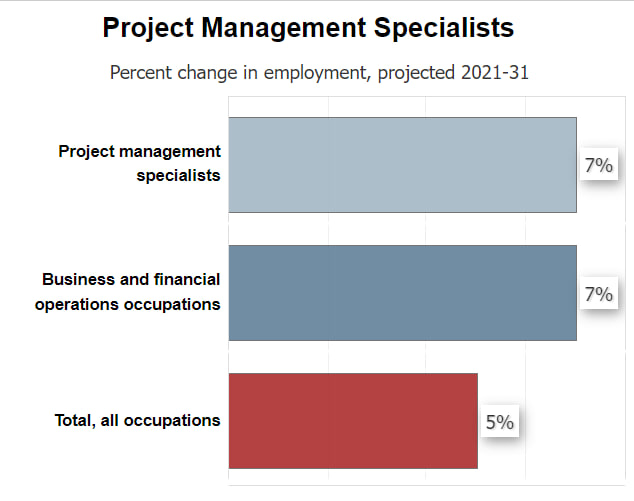The Ultimate Guide to Project Manager’s Career

Project management is a critical role in organizations across various industries, responsible for leading teams to achieve specific goals and objectives within a defined timeline and budget. To be successful in this role, project managers need to possess a combination of technical, interpersonal, and leadership skills.
This article explores various aspects of project management as a career, including the average salary for project managers, work environment settings, tools and technologies used, education and training requirements, career ladder and specializations, job outlook, and pros and cons of the profession. By understanding these different aspects, individuals can make informed decisions about pursuing project management as a career path.
Position Overview
A project manager is a professional responsible for leading a team to achieve specific goals and objectives within a defined timeline and budget. Project managers oversee all aspects of a project, including planning, execution, monitoring, controlling, and closing, to ensure it meets its goals and objectives. Project managers are typically employed in various industries, including construction, engineering, software development, marketing, and many others.

Key Qualifications
The key qualifications of a project manager typically include a combination of technical, interpersonal, and leadership skills. Here are some of the most important qualifications:
- Project Management Knowledge: A project manager should have a thorough understanding of project management methodologies, tools, and techniques. They should be able to create project plans, manage budgets, schedules, and resources, and oversee project execution.
- Communication Skills: A project manager should be an effective communicator, capable of conveying information clearly and concisely to stakeholders at all levels. They should be able to listen actively, ask questions, and provide feedback to team members.
- Leadership Skills: A project manager should be a strong leader, capable of inspiring and motivating team members to achieve their best work. They should be able to delegate tasks, provide guidance and support, and manage conflicts.
- Risk Management Skills: A project manager should have the ability to identify potential risks and develop strategies to mitigate them. They should be able to create risk management plans, assess the impact of risks on the project, and take appropriate actions to minimize the effects.
- Problem-Solving Skills: A project manager should have strong problem-solving skills, capable of identifying issues and developing solutions to overcome them. They should be able to think creatively, analyze data, and make sound decisions under pressure.
- Time Management Skills: A project manager should be able to manage their time effectively, prioritize tasks, and meet deadlines. They should be able to balance competing demands and allocate resources appropriately.
- Adaptability: A project manager should be adaptable, capable of adjusting to changing circumstances and requirements. They should be able to respond to feedback, learn from experience, and continuously improve their skills and knowledge.
Interesting fact:
Project management is one of the fastest-growing professions in the world, with an estimated 33 million people working as project managers globally.
Tasks and Expectations
The tasks and expectations of a project manager can vary depending on the industry, organization, and project they are working on. However, some common tasks and expectations of a project manager include:
- Defining Project Scope: A project manager should define the project's goals, objectives, deliverables, and timeline. They should also identify project stakeholders and create a project charter.
- Developing Project Plan: A project manager should create a detailed project plan, including tasks, timelines, budgets, resources, and risks. They should also establish a project communication plan to ensure stakeholders are informed and engaged throughout the project lifecycle.
- Assigning Tasks: A project manager should assign tasks to team members based on their skills, availability, and workload. They should also monitor task progress and ensure they are completed on time and to the required quality standards.
- Managing Resources: A project manager should manage project resources, including people, equipment, and materials. They should ensure resources are allocated effectively and efficiently to support project objectives.
- Monitoring Project Performance: A project manager should monitor project performance, including schedule, budget, quality, and scope. They should identify and address deviations from the project plan and take corrective actions as necessary.
- Leading the Project Team: A project manager should lead the project team, providing guidance, support, and motivation. They should ensure team members are clear on their roles and responsibilities and have the resources and support they need to complete their tasks.
- Reporting Project Status: A project manager should report project status regularly to stakeholders, including progress, issues, risks, and budget. They should ensure stakeholders are informed and engaged throughout the project lifecycle.
- Closing the Project: A project manager should close the project when it is complete, including delivering the final product, obtaining sign-off from stakeholders, and archiving project documents. They should also conduct a project review to identify lessons learned and opportunities for improvement.
Compensation
The salary of a project manager in the US can vary depending on a number of factors, including the industry, company size, location, level of experience, and educational background. According to data from PayScale, the average salary for a project manager in the US is approximately $77,700 per year.

Source: PayScale
However, this is just an average and individual salaries can vary significantly based on the factors mentioned above. For example, project managers in certain industries such as IT or engineering may earn higher salaries than those in other industries. Additionally, project managers with more experience and education are likely to earn higher salaries.
Also, salaries can vary significantly depending on the location. For example, project managers in larger cities such as New York, San Francisco, or Los Angeles may earn higher salaries due to the higher cost of living in these areas.
Strategies for Increasing Income
Here are a few strategies that project managers can use to increase their income:
Strategy | Description |
Develop and refine your skills | One way to increase your income as a project manager is to continually develop and refine your skills. This can include getting certified in project management methodologies or tools, taking courses to develop your technical or soft skills, or attending conferences and networking events to stay up-to-date on industry trends. |
Pursue higher education | Earning a higher degree, such as an MBA or a master's degree in project management, can help you qualify for higher-paying positions and give you a competitive edge in the job market. |
Negotiate your salary | When starting a new job or renegotiating your current salary, don't be afraid to negotiate. Research the market rates for your position and experience level, and make a strong case for why you deserve a higher salary. |
Seek out higher-paying industries | As mentioned earlier, some industries pay project managers more than others. Consider looking for positions in industries such as IT, engineering, or construction, where project management roles are often higher-paying. |
Take on more responsibilities | Volunteering for more responsibilities and demonstrating your value as a project manager can lead to promotions and raises. Be proactive about seeking out opportunities to take on additional responsibilities and make an impact in your organization. |
Consider freelancing or consulting | If you have a solid reputation as a project manager and a strong network, you may be able to earn higher rates by freelancing or consulting. This can give you more control over your income and schedule, but may require more self-promotion and business development efforts. |
Interesting fact:
Project management is recognized as one of the top 10 most important skills for future-proofing your career.
Supplementary Perks
In addition to increasing their income, project managers may also consider negotiating for additional benefits as part of their compensation package. Some benefits to consider include:
- Health insurance: Many employers offer health insurance benefits to their employees, which can include coverage for medical, dental, and vision care. These benefits can help you save money on healthcare costs and ensure that you have access to necessary medical care.
- Retirement savings plans: Employers may offer retirement savings plans such as 401(k) or IRA accounts, which can help you save for your future. Some employers also offer matching contributions, which can help your savings grow even faster.
- Flexible work arrangements: Flexible work arrangements, such as remote work options or flexible schedules, can help you achieve a better work-life balance and reduce stress.
- Professional development opportunities: Employers may offer opportunities for professional development, such as training programs, conference attendance, or tuition reimbursement. These opportunities can help you improve your skills and advance your career.
- Paid time off: Paid time off, such as vacation days, sick days, and holidays, can help you recharge and maintain a healthy work-life balance.
- Employee stock options: Some companies offer stock options to their employees, which can provide additional income if the company's stock value increases.
Negotiating for additional benefits can be an effective way to increase your total compensation package and improve your overall job satisfaction.
Work Environment
This section will explore the work environment settings and the tools and technologies used by project managers to achieve project success. By understanding and implementing these settings and tools, project managers can effectively manage projects, meet deadlines, and drive team collaboration.

Photo: Christina @ wocintechchat.com/Unsplash
Work Environment Settings
As a project manager, it's important to create a work environment that is conducive to productivity and collaboration. Here are some key settings to consider:
- Physical workspace: Whether you work in an office or from home, your physical workspace should be comfortable and well-equipped. This includes a desk and chair that are ergonomically designed, proper lighting, and any necessary tools and equipment such as a computer, phone, and printer.
- Support network: It's important to have a support network of colleagues, mentors, and advisors to turn to when you need guidance or assistance. This can include other project managers within your organization, industry associations, or online communities.
- Professional development opportunities: To stay up-to-date with the latest trends and best practices in project management, it's important to seek out professional development opportunities such as conferences, workshops, and online courses. This can help you stay current and continue to grow in your career.
Overall, creating a work environment that is supportive and conducive to productivity is essential for project managers. By considering these key settings, you can set yourself up for success and effectively manage projects to meet your goals.
Interesting fact:
Project managers spend an average of 90% of their time communicating. So, communication skills are essential for success in the field.
Tools and Technologies
Project managers use a wide range of tools and technologies to plan, execute, and manage projects. Here are some commonly used tools and technologies by project managers:
Tools and Technologies | Description |
Project management software | These tools help project managers create and manage project plans, assign tasks, and track progress. Examples include Microsoft Project, Asana, Trello, and Basecamp. |
Communication tools | Communication is crucial for project success, so project managers use various tools such as email, instant messaging, and video conferencing to keep team members informed and collaborate effectively. |
Document management tools | Project managers use document management tools to manage project documentation such as project plans, meeting minutes, and other important files. Examples include Google Drive, Dropbox, and SharePoint. |
Time management tools | Time management tools such as calendars, to-do lists, and time tracking software help project managers stay organized and ensure that deadlines are met. |
Risk management tools | Risk management tools help project managers identify potential risks and develop strategies to mitigate them. Examples include risk assessment templates and risk management software such as RiskyProject and Palisade. |
Financial management tools | Financial management tools such as accounting software and budgeting tools help project managers track project costs and expenses. |
Collaboration tools | Collaboration tools such as video conferencing, online whiteboards, and screen sharing software help project managers and team members work together effectively, especially when remote. |
Project managers use a variety of tools and technologies to manage projects and ensure their success. The specific tools and technologies used may vary depending on the nature and scope of the project, the industry, and the organization.

Photo: Christina @ wocintechchat.com/Unsplash
Education and Training
Education and training are essential for project managers to succeed in their roles. Here are some of the options available:
- Bachelor's Degree: Many project managers have a bachelor's degree in fields like business administration, engineering, or project management.
- Project Management Certification: Project Management Professional (PMP) certification from the Project Management Institute (PMI) is the most recognized certification for project managers. Another certification you may consider is Certified Associate in Project Management (CAPM).
- Project Management Courses: There are numerous online and in-person courses available that cover project management principles and techniques, as well as specific tools and software used in project management.
- Industry-Specific Training: Some industries, such as construction or healthcare, may have specific training programs or certifications that are tailored to their unique needs.
- On-the-Job Training: Project managers can learn a great deal through on-the-job training by working closely with experienced project managers, mentors, or coaches.
- Continuing Education: Continuing education is essential for project managers to stay up-to-date on new developments, trends, and best practices in the field.
Project managers should pursue a combination of education and training options to develop the skills needed to manage projects effectively.
Interesting fact:
A project manager's success is not just measured by whether a project is completed on time and within budget, but also by the quality of the outcome and the satisfaction of stakeholders.
Advancement Opportunities
In this section, we will explore the career ladder for project managers, including the typical roles and responsibilities at each level. We will also discuss some of the most popular specializations in project management and the unique skills and knowledge required for each. Finally, we will introduce some other career options for individuals with project management skills and experience, highlighting the transferability of these skills across many different industries and roles.

Photo: Christina @ wocintechchat.com/Unsplash
Career Ladder for Project Managers
Project management is a popular career choice for those who enjoy leading teams, organizing resources, and overseeing the completion of complex projects. The career ladder for project managers typically involves a progression of roles, each with increasing levels of responsibility and skill requirements.
- Project Coordinator: This is an entry-level position that involves providing support to a project manager. Duties may include creating and maintaining project schedules, preparing reports, and organizing project documentation.
- Project Manager: As a project manager, you will be responsible for planning, executing, and closing projects. You will be the primary point of contact for stakeholders, and you will lead a team of project coordinators and other support staff. This role requires strong organizational, communication, and leadership skills.
- Senior Project Manager: A senior project manager typically oversees larger, more complex projects or a portfolio of smaller projects. They may also have responsibility for managing other project managers. This role requires extensive experience and expertise in project management.
- Program Manager: A program manager is responsible for managing a group of related projects that are designed to achieve a specific strategic goal. They are responsible for coordinating the resources, schedules, and budgets for all the projects within the program.
- Director of Project Management: A director of project management is responsible for the overall management of an organization's project portfolio. This role requires a deep understanding of the business, strong leadership skills, and the ability to manage multiple projects simultaneously.
- Vice President of Project Management: A vice president of project management is a senior executive who oversees all project management functions within an organization. They are responsible for setting the strategic direction for project management and ensuring that all projects align with the organization's goals and objectives.
The career ladder for project managers may vary depending on the organization, industry, and specific role. However, these roles represent a typical progression for project management professionals.
Interesting fact:
The most common project management methodology is Agile.
Specializations in Project Management
Project management is a broad field with many specializations. Here are some of the most popular specializations in project management:
Specialization | Description |
IT Project Management | IT project managers oversee projects related to the development and implementation of information technology systems, software, and hardware. |
Construction Project Management | Construction project managers oversee building projects, including new construction, renovation, and restoration projects. |
Agile Project Management | Agile project management is an iterative approach to project management that is popular in software development and other industries where rapid development cycles are necessary. |
Healthcare Project Management | Healthcare project managers oversee projects related to the development and implementation of new medical technologies, healthcare facilities, and patient care programs. |
Event Project Management | Event project managers oversee the planning and execution of large-scale events, such as conferences, concerts, and festivals. |
Marketing Project Management | Marketing project managers oversee the planning and execution of marketing campaigns, including advertising, public relations, and digital marketing initiatives. |
Environmental Project Management | Environmental project managers oversee projects related to environmental conservation, management, and remediation, such as the construction of renewable energy facilities and environmental impact assessments. |
Supply Chain Project Management | Supply chain project managers oversee projects related to the design, implementation, and optimization of supply chain processes, including logistics, inventory management, and procurement. |
Pharmaceutical Project Management | Pharmaceutical project managers oversee the development and implementation of new pharmaceutical products, including clinical trials, regulatory compliance, and marketing. |
Financial Project Management | Financial project managers oversee projects related to financial management, including budgeting, forecasting, and financial reporting. |
Each specialization requires a unique set of skills and knowledge, and professionals can choose to specialize in one or more areas depending on their interests and career goals.

Photo: Mimi Thian/Unsplash
Other Career Possibilities
There are many career options available for individuals with project management skills and experience. Here are some examples:
- Business Analyst: Business analysts work closely with project managers and stakeholders to identify and document business requirements for projects.
- Operations Manager: Operations managers oversee the day-to-day operations of a business or organization, ensuring that processes and procedures are efficient and effective.
- Management Consultant: Management consultants provide expert advice to organizations on how to improve their operations, strategy, and overall performance.
- Product Manager: Product managers oversee the development and marketing of products, from ideation to launch and beyond.
- Data Analyst: Data analysts collect, analyze, and interpret data to help organizations make informed business decisions.
- Human Resources Manager: Human resources managers oversee the recruitment, training, and management of employees, as well as policies related to employee relations and benefits.
- Sales Manager: Sales managers lead sales teams, develop sales strategies, and set sales targets to meet revenue goals.
- Quality Assurance Manager: Quality assurance managers oversee the development and implementation of quality control processes to ensure that products or services meet quality standards.
- Customer Success Manager: Customer success managers work to ensure that customers are satisfied with products or services and oversee customer support and engagement.
These are just a few examples of the many career options available to individuals with project management skills and experience. The skills and experience gained through project management can be applied to many different industries and roles, providing a wide range of opportunities for career growth and development.
Employment Trends
In this section, we will explore the job outlook for project managers in the US, and the various flexible and remote work arrangements that project managers can take advantage of to enhance their productivity and job satisfaction.
Project Managers Demand
According to the Bureau of Labor Statistics (BLS), the job outlook for project managers in the US is positive. The BLS projects that employment for project management professionals will grow by 7% from 2021 to 2031, which is about as fast as the average for all occupations. This growth is attributed to the increasing complexity of projects in various industries and the need for skilled project managers to ensure their success.

Source: U.S. Bureau of Labor Statistics, Employment Projections program
The BLS also notes that job prospects will be best for those with a bachelor's degree in a related field, as well as relevant work experience and professional certification. Additionally, project managers with expertise in specific industries or with specialized skills, such as agile project management or risk management, may have even better job prospects.
Overall, the job outlook for project managers in the US is positive, and those with the right education, experience, and certifications are likely to have good opportunities for employment and career advancement.
Flexible and Remote Work Arrangements
Flexible and remote work arrangements are becoming increasingly common for project managers, as many organizations recognize the benefits of offering these options to their employees. Here are some common flexible and remote work arrangements that project managers may be able to take advantage of:
- Telecommuting: This involves working from home or another remote location, using technology to stay connected to the rest of the team. Many project management tools and software applications are available that enable remote teams to collaborate effectively.
- Flexible hours: Some organizations allow employees to work flexible hours, such as starting and ending work earlier or later than traditional business hours. This can be beneficial for project managers who need to accommodate the schedules of team members in different time zones or who have other personal or family obligations.
- Compressed workweek: This involves working longer hours for fewer days each week, such as working four 10-hour days instead of five 8-hour days. This can be beneficial for project managers who need longer stretches of uninterrupted time to focus on their work.
- Job sharing: This involves two employees sharing the responsibilities of a single job, which can be beneficial for project managers who want to work part-time or who have other commitments that limit their availability.
- Hybrid work: This involves a combination of in-person and remote work, allowing employees to work from home or another remote location for part of the week and come into the office for the rest. This can be beneficial for project managers who want the flexibility of remote work but also value the face-to-face interaction and collaboration that comes with in-person work.
Flexible and remote work arrangements can be beneficial for project managers, allowing them to better balance work and personal responsibilities, reduce commuting time and costs, and increase productivity and job satisfaction. However, it is important for project managers to communicate effectively with their team members and stakeholders, and to have the right tools and processes in place to ensure that projects are managed effectively regardless of the work arrangement.
Interesting fact:
The success rate of projects managed by certified project managers is much higher than those without certification, with one study reporting a 20% increase in project success rates.
Job Fulfillment
In this section, we will discuss the pros and cons of being a project manager. Project managers are responsible for leading projects from start to finish, ensuring that they are completed on time, within budget, and to the satisfaction of stakeholders. While project management can be a rewarding and lucrative career, it also comes with its own set of challenges and potential drawbacks. And understanding the pros and cons of this role can help individuals decide whether project management is the right career path for them.
Pros | Cons |
High earning potential Project managers are typically well-compensated for their work, and the salary can be quite high, depending on the industry and level of experience. | Stressful work Project managers must manage timelines, budgets, and stakeholder expectations, which can be stressful and lead to long work hours. |
Career advancement opportunities Project management is a valuable skill set in many industries, and project managers often have opportunities to move up the ranks and take on more challenging projects. | Communication challenges Project managers must communicate effectively with team members and stakeholders, which can be challenging, especially when dealing with remote teams or stakeholders from different cultures. |
Variety of work Project managers work on a wide range of projects in different industries, so the work is varied and never boring. | Uncertainty Projects can be unpredictable, and project managers may need to make changes on the fly to ensure success. |
Leadership experience Project managers are responsible for leading teams and managing stakeholders, which provides valuable leadership experience. | Risk management Project managers must identify and mitigate risks to the project, which can be time-consuming and stressful. |
Improved organizational skills Project managers must be highly organized and detail-oriented to be successful, which can translate to other areas of their lives. | Responsibility for project success As the project manager, you are responsible for the success or failure of the project, which can be a lot of pressure. |

Photo: Christina @ wocintechchat.com/Unsplash
Project management is a complex and challenging field that requires a diverse set of skills and experiences. However, it is also a rewarding career path with high earning potential, career advancement opportunities, and a variety of work. As organizations continue to rely on project managers to drive successful project execution, the demand for skilled project managers is expected to grow. With proper education, training, and the right tools and processes, individuals can excel in this field and contribute to the success of organizations.
While there are some challenges and risks associated with project management, understanding these can help individuals make informed decisions about whether it is the right career path for them. Overall, project management offers a dynamic and fulfilling career path for those who are up to the challenge.
- Project managers are responsible for leading teams to achieve specific goals and objectives within a defined timeline and budget.
- To be successful in this role, project managers need to possess a combination of technical, interpersonal, and leadership skills.
- The average salary for project managers in the US can vary depending on various factors such as industry, location, experience, and education level. But, the average salary for a project manager is $77,700 per year.
- A supportive work environment and the right tools and technologies are essential for project managers to achieve project success.
- Education and training are critical for project managers to succeed in their roles, including a bachelor's degree, project management certification, and industry-specific training.
- Project management offers a variety of career opportunities, including different roles and responsibilities at each level and popular specializations in IT, construction, and healthcare project management.
- The job outlook for project managers in the US is positive, with projected growth of 7% from 2021 to 2031
FAQ
What are the different project management methodologies?
There are several project management methodologies, including Agile, Waterfall, Scrum, Lean, and Six Sigma. Each methodology has its own set of principles, practices, and tools, and is best suited for specific types of projects.
What are the benefits of hiring a project manager?
Hiring a project manager can provide several benefits, including improved project planning, better resource allocation, reduced risks, increased project success rates, and improved communication and collaboration among team members.
What are some key performance indicators (KPIs) used in project management?
Some key performance indicators used in project management include project completion rate, project timeline, budget variance, resource utilization, customer satisfaction, and project team satisfaction.
Project managers measure project success by comparing the actual project results to the project goals and objectives. They may use metrics such as project completion rate, customer satisfaction, and return on investment to determine whether the project was successful.
How do project managers handle conflicts within project teams?
Project managers handle conflicts within project teams by identifying the root cause of the conflict, facilitating communication and collaboration among team members, and finding a mutually acceptable solution. They may also need to provide coaching or training to team members to improve communication and collaboration.